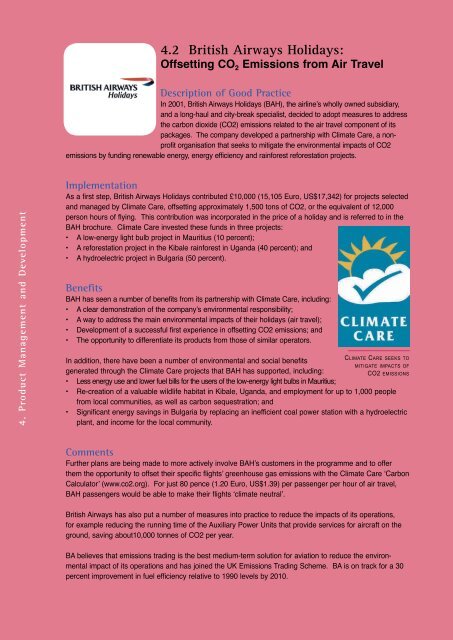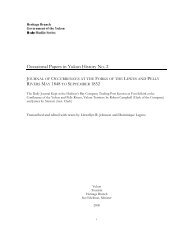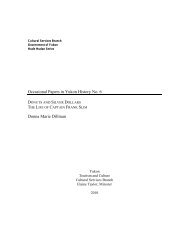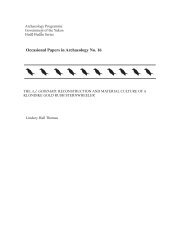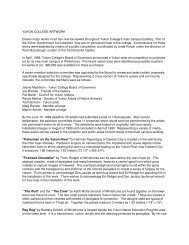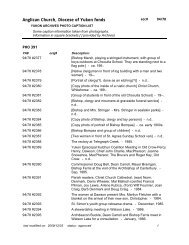Sustainable Tourism: The Tour Operators' Contribution
Sustainable Tourism: The Tour Operators' Contribution
Sustainable Tourism: The Tour Operators' Contribution
You also want an ePaper? Increase the reach of your titles
YUMPU automatically turns print PDFs into web optimized ePapers that Google loves.
4. Product Management and Development<br />
4.2 British Airways Holidays:<br />
Offsetting CO 2 Emissions from Air Travel<br />
Description of Good Practice<br />
In 2001, British Airways Holidays (BAH), the airline’s wholly owned subsidiary,<br />
and a long-haul and city-break specialist, decided to adopt measures to address<br />
the carbon dioxide (CO2) emissions related to the air travel component of its<br />
packages. <strong>The</strong> company developed a partnership with Climate Care, a nonprofit<br />
organisation that seeks to mitigate the environmental impacts of CO2<br />
emissions by funding renewable energy, energy efficiency and rainforest reforestation projects.<br />
Implementation<br />
As a first step, British Airways Holidays contributed £10,000 (15,105 Euro, US$17,342) for projects selected<br />
and managed by Climate Care, offsetting approximately 1,500 tons of CO2, or the equivalent of 12,000<br />
person hours of flying. This contribution was incorporated in the price of a holiday and is referred to in the<br />
BAH brochure. Climate Care invested these funds in three projects:<br />
• A low-energy light bulb project in Mauritius (10 percent);<br />
• A reforestation project in the Kibale rainforest in Uganda (40 percent); and<br />
• A hydroelectric project in Bulgaria (50 percent).<br />
Benefits<br />
BAH has seen a number of benefits from its partnership with Climate Care, including:<br />
• A clear demonstration of the company’s environmental responsibility;<br />
• A way to address the main environmental impacts of their holidays (air travel);<br />
• Development of a successful first experience in offsetting CO2 emissions; and<br />
• <strong>The</strong> opportunity to differentiate its products from those of similar operators.<br />
climate care seeks to<br />
In addition, there have been a number of environmental and social benefits<br />
generated through the Climate Care projects that BAH has supported, including:<br />
• Less energy use and lower fuel bills for the users of the low-energy light bulbs in Mauritius;<br />
• Re-creation of a valuable wildlife habitat in Kibale, Uganda, and employment for up to 1,000 people<br />
from local communities, as well as carbon sequestration; and<br />
• Significant energy savings in Bulgaria by replacing an inefficient coal power station with a hydroelectric<br />
plant, and income for the local community.<br />
mitigate impacts of<br />
co2 emissioNs<br />
Comments<br />
Further plans are being made to more actively involve BAH’s customers in the programme and to offer<br />
them the opportunity to offset their specific flights’ greenhouse gas emissions with the Climate Care ‘Carbon<br />
Calculator’ (www.co2.org). For just 80 pence (1.20 Euro, US$1.39) per passenger per hour of air travel,<br />
BAH passengers would be able to make their flights ‘climate neutral’.<br />
British Airways has also put a number of measures into practice to reduce the impacts of its operations,<br />
for example reducing the running time of the Auxiliary Power Units that provide services for aircraft on the<br />
ground, saving about10,000 tonnes of CO2 per year.<br />
BA believes that emissions trading is the best medium-term solution for aviation to reduce the environmental<br />
impact of its operations and has joined the UK Emissions Trading Scheme. BA is on track for a 30<br />
percent improvement in fuel efficiency relative to 1990 levels by 2010.


